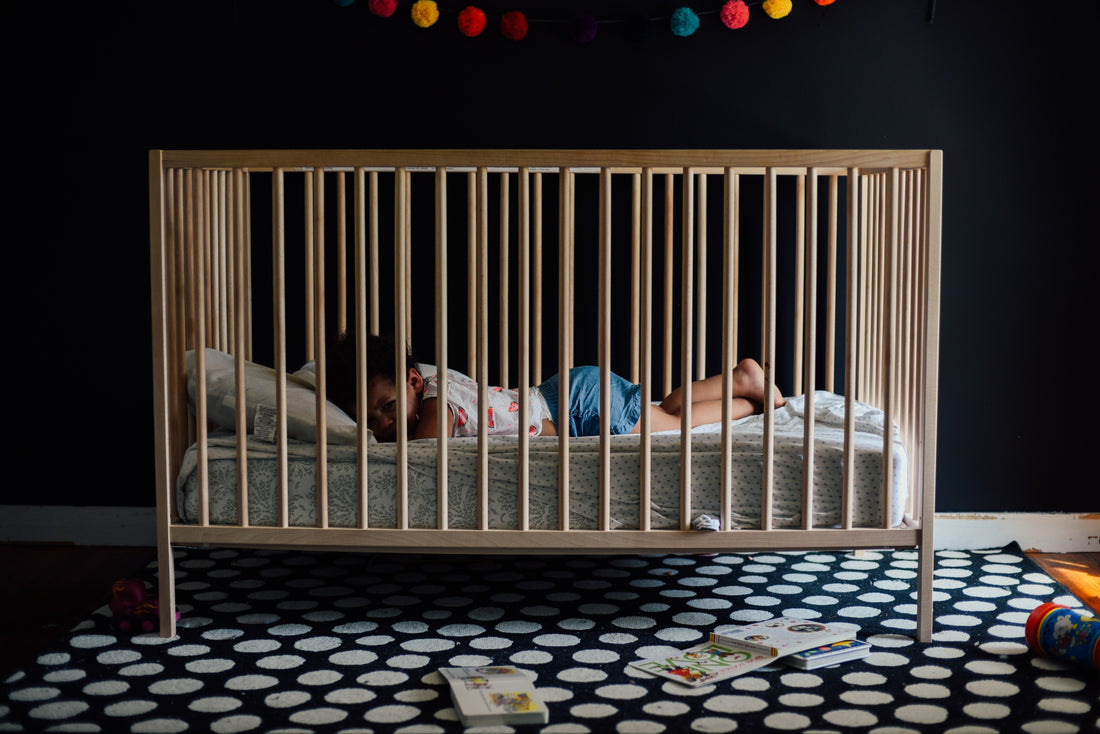
Baby Sleep: How To Get A Baby To Sleep In A Crib
Josie SivignyMoms and dads helping their baby sleep independently in a crib can feel like a battle with no end in sight. Not only can it take an emotional toll with a crying baby, but it also whittles away at the little sleep new parents are getting to begin with.
If you’re struggling with adjusting your baby to crib sleeping, don’t worry—you aren’t alone! Here are some tips and tricks to help with this transition so that mom, dad, and baby can get the rest they need.
Why won’t your baby sleep in their crib?
Babies seek out comfort and familiarity, especially after hanging out in their mom’s womb for 9 months.
If your baby falls asleep in your arms or after feeding, they’re probably used to that closeness and physical contact. The warmth of a parent and even their smell can make your baby feel safe and relaxed. Infants need that physical closeness, but like any new adjustment, it’s hard to break a comforting habit as they get big enough to sleep on their own.
Some babies love the motion of being rocked to sleep, like the calming motion they experienced in the womb. Whether it’s someone’s arms, a stroller, or infant bouncers, it could be hard for a baby to get used to a motionless crib.
Older babies on the cusp of toddlerhood might just have sleep preferences and habits that make them feel secure. Changing it up can feel scary, so it’s going to take time and patience to help them want to or accept sleeping in their own bed at night.
Some babies also experience sleep regression, a period of time a baby’s development interferes with their sleep. If your baby is struggling with a normally seamless routine, your baby could be in a sleep regression phase and needs time to adjust.
When should a baby start sleeping in a crib?
If you know you want your baby to sleep in their crib, it’s a good idea to start doing it before their 6th-month mark. As suggested before, the older your baby gets, the harder it will be for them to break away from the habits they find comforting.
Around 4 months is when a baby’s sleep cycle begins to be more like ours, and many parents start sleep training then. Most parents start the transition sometime between 3-6 months when their baby is ready to graduate from their bassinet.
The benefits of sleeping in a crib
Many parents opt to co-sleep with their babies, sometimes even into their toddler years. It’s completely up to each parent on what their child needs, but there are some benefits of your baby sleeping in their own adorable bed.
- It’s the safest place for your baby to sleep.
- Your child will most likely wake up less and improve the overall quality of their sleep.
- Mom and dad get to sleep better, which means your baby has happier, healthier caregivers.

How to get your baby to sleep in a crib
Wean your baby off of other carriers. Whether it’s a stroller, rocker, or sling, your baby needs to get used to a lack of movement. You could start by putting your baby in their preferred carrier, but limiting the motion of whatever they’re in.
Put your baby in their crib before they fall asleep. Especially if they still need some rocking or feeding, try to put your baby in their crib before they’re completely asleep. That way, the precarious transition from your arms to the crib won’t wake your baby up. This also helps teach the baby to start learning to fall asleep on their own so they are less reliant on you.
Help your baby associate their crib with the comfort of their parents. Babies will miss your warmth or presence, so if their crib doesn’t feel stiff and cold, it can help them transition easier. Make sure, though, that you’re using blankets carefully—leaving a blanket in the crib with your baby can lead to sudden infant death syndrome (SIDS). Opt for swaddling them, or feeding them before to recreate that sense of warmth. Some parents even sleep with a baby’s sheets first to give their baby a familiar scent at night.
Double-check the environment of the room. You want your baby to have the warmth they might miss from cuddling or sleeping with a parent, but you also don’t want babies to get overheated. It prevents them from sleeping soundly and can also be hard on their little bodies. Keep the room moderately cool, and then make sure your little one has warm, snuggly sleepwear. Some babies also sleep better with a little white noise or dark lighting.
Stick to your routines. Little ones need consistency, so once you commit to crib training, stick with it! It can be hard for moms and dads to let their baby cry it out, or some parents might struggle to let go of sleeping with their baby, just like the baby does. But most babies just need some time to get used to new things and will benefit from a little independence. Make naptime and going to bed as repeatable and similar as possible.
Moms and dads need sleep, just like their baby. Taking care of yourself as a new parent shouldn’t always come last, so do your baby and yourself a favor and stay healthy. Helping your baby transition to sleep in a crib isn’t always easy, but it is possible! Get more wellness and sleep tips from Tuft & Needle here.



